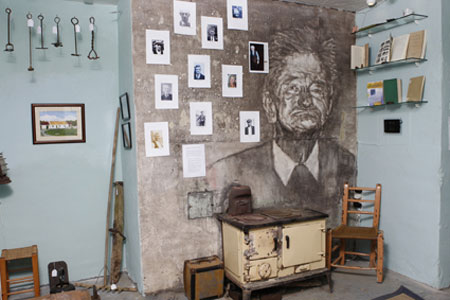469
Arte Útil archive nr:
469
Initiator:
Deidre O’Mahony
Location:
Ireland
Category:
pedagogical, politics, environment, social
Users:
Amanda Dunsmore, Sennan Kileen, Michael Fortune, Jay Koh, Juliette de la Mere, Megs Morley, Micky Donnelly, Jim Vaughan, Deirdre O’Mahony, Peter Rees, Rinnamona Research Group, Francis Whelan, X-PO Mapping/Irish/Singers/Craft Groups, Julius Zus.
Maintained by:
Initial Phase: Deirdre O’Mahony, now maintained and funded by a team of X-PO Participants. Funding Initial phase the Arts Council, SuperValu, Clare County Arts Office, Latterly primary funding from participants and local fundraisers.
Certification:
implemented
Duration:
2007 - ongoing
Deidre O’Mahony
-
X-PO
Description:
“The landscape of the west of Ireland has immense cultural importance, serving a double function as a representation of the post-colonial nation state and as a signifier of alterity in Ireland. My focus has been on reframing landscape and cultivation knowledge as part of an active mode of cultural reflection not a
nostalgic reminder of a purer past. Over the past forty years subsidies have driven change in Irish farming, leading to unsustainable surpluses. Paradoxically, those same policies have saved the otherwise economically unsustainable, small farms in the west of Ireland, preserving much of the tacit, place-based knowledge. Legislation and rural development policies now promote the farmer as custodian of the landscape a paradigmatic shift from landscapes as sites of food production to arenas of cultural production. The conservation and regulation of this post- agricultural landscape is often deeply contested. Access to the decision-making processes is limited and conflicts arising from hierarchical attitudes by state experts that ignore or disregard place-based knowledge, are commonplace. I initiated X-PO in 2007 in a former post-office in the Burren in the west of Ireland ̧ a landscape considered ’high nature value’ by the EU. Re-named ’X-PO’, it functions as a reflexive space where the social, economic and environmental future of rural public life is open for discussion. Providing social space for incomers and locals to meet, it allows different forms of knowledge; farming, artistic, academic and place-based, to make unexpected connections and conjunctions. Participants run weekly clubs in singing, mapping, crafts, painting and film. It provides a very visible
aesthetic, public, space from which to discuss, disagree and challenge ideas of consensus within local decision making processes and offers the possibility of arriving at sustainable solutions to living in a changing, socially fragmented landscape." (Deidre O’Mahony)
Goals:
Re-activate a former rural post office through a collaborative exchange process between artist and different communities. Establish social and cultural
clubs for locals and incomers. Create archives of local, place-based knowledge. Curate a programme of exhibitions, events and talks to animate and activate a discourse that publicly complicates perceptions of rural life as simple and slow. Network and connect with other like-minded agencies and initiatives. Initiate collaborative exhibition-making processes and make place based knowledge visible to wider audiences and new contexts. Provide a model of local democracy that can be applied to other places. Make available traditional farming knowledge to contemporary urban publics. Demystify simple food production.
Beneficial Outcomes:
It is participant-led, self-sustaining and is now economically self-sufficient after the initial activation period. It has created four archives that have publicly complicated received understandings of landscape and land use. Provides an open social/cultural space for different publics in the region to meet socially. Provides a space for weekly clubs, occasional talks, film nights, collaborative exhibitions, site or context-specific interventions and events. Embodies the micropolitics of a plurality of voices performing a kind of coming-together based on the here and now, not on a priori relations or on inherited standing in the ’community’. Exemplifies a model of participative action providing space for individual and social empowerment. While laying no claim to be representative. It informs local development policy making by being too visible to be overlooked in consultative fora. Allows open space for disagreement and dissent.
Images:

